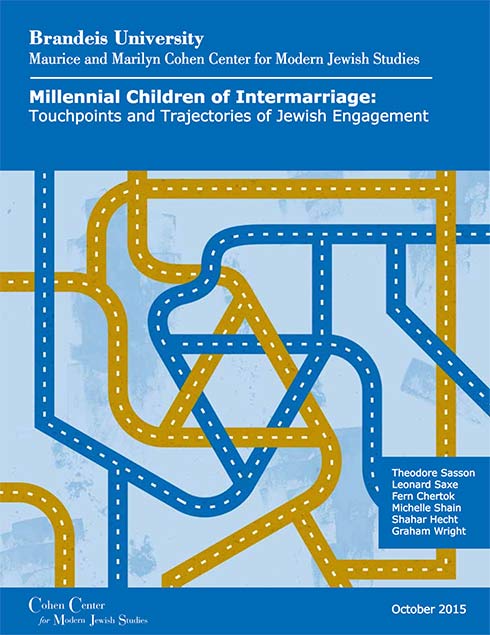Millennial Children of Intermarriage: Touchpoints and Trajectories of Jewish Engagement
Theodore Sasson, Leonard Saxe, Fern Chertok, Michelle Shain, Shahar Hecht, Graham Wright
October 2015
 Millennial Children of Intermarriage: Touchpoints and Trajectories of Jewish Engagement is the first comprehensive assessment to examine the religious upbringing, college experiences, and current attitudes and practices of millennial children of intermarriage. This is the first cohort born after the intermarriage rate in America crossed the 50% threshold and currently comprises half of the young adult Jewish population. Based on a survey with nearly 2,700 respondents (ages 19-32) and interviews in four cities, the study finds that college Jewish experiences can have a profound impact, with the potential of closing the gap between children of intermarriage and children of inmarriage on many measures of Jewish engagement.
Millennial Children of Intermarriage: Touchpoints and Trajectories of Jewish Engagement is the first comprehensive assessment to examine the religious upbringing, college experiences, and current attitudes and practices of millennial children of intermarriage. This is the first cohort born after the intermarriage rate in America crossed the 50% threshold and currently comprises half of the young adult Jewish population. Based on a survey with nearly 2,700 respondents (ages 19-32) and interviews in four cities, the study finds that college Jewish experiences can have a profound impact, with the potential of closing the gap between children of intermarriage and children of inmarriage on many measures of Jewish engagement.
- Read the report
- Read the technical appendices
- Read the oped: How College Can Put the Jewish in Children of Intermarriage. The Forward. November 10, 2015
Key Findings
- Children of intermarriage were less likely than children of inmarriage to have attended a Jewish day school or supplementary school, observed Jewish holidays, and participated in informal Jewish social and educational activities during their childhood or teen years.
- As a result, children of intermarriage were less likely during their college years to participate in a Jewish group (e.g., Hillel or Chabad) or take a Jewish or Israel-related course. Among applicants to Birthright Israel, they were less likely to go on a trip, and less likely to do so during their college years.
- Among the substantial number of children of intermarriage that did participate in Jewish activities during college—in particular Birthright Israel and campus-based Jewish groups —the impact was profound. At the time they completed the survey, they were much more likely to observe Jewish holidays and practices, feel connected to Israel and the Jewish people, have Jewish friends and partners, and believe that it is important to raise children Jewish.
- College Jewish experiences were, for most outcomes, more influential for children of intermarriage than children of inmarriage, nearly closing the gap on many measures of Jewish engagement.